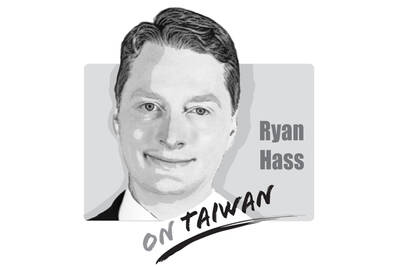Taiwan’s victory in the World Baseball Softball Confederation’s Premier12 championship is a wonderful moment for the country and a reminder of the power of sports to bring people together and instill public pride in the nation.
Taiwan is in a golden age of soft power and international visibility. Taiwan’s baseball heroes joining the nation’s democracy and LGBTQ+ rights movements, former president Tsai Ing-wen’s (蔡英文) internationally renowned leadership and now diplomatic role, the nation’s handling of the COVID-19 pandemic, its semiconductor and advanced technology industries, and Nymphia Wind (妮妃雅), the pride of Taiwan’s queer community, who won US reality show RuPaul’s Drag Race in April, are all manifesting Taiwan’s spirit and values on the world stage.
It is a reminder that when Taiwan is given an opportunity to express itself, it makes a warm and positive contribution to the world.
Baseball is one of the few things that can unite Taiwanese across the political divide, allowing people to find common ground in support of a shared passion. However, while the whole nation came together in supporting the team, the messages of congratulations from politicians — “Team Taiwan” or “Team Chinese Taipei” — brought to the fore hidden fractures, revealing the polarized national vision of the two sides.
Introduced to Taiwan by Japan during the colonial era, the sport was strategically embraced by the Chinese Nationalist Party (KMT) as a vehicle to promote its version of Chinese nationalism. Taiwan’s domination of Little League Baseball — winning 17 championships in less than 30 years from the 1960s through the 1990s — was linked to strong interventions by the KMT, which helped the regime maintain its ideological legitimacy at home and abroad as the “real China,” Fu Jen Catholic University adjunct assistant professor of sociology Daniel Yu-Kuei Sun (孫又揆) wrote on the topic.
However, with democratization in the 1990s and the KMT no longer the only powerful party, the meaning of the sport has changed, and it is now an important symbol of Taiwanese identity. In recent years, “Team Taiwan” has become the go-to phrase for Taiwanese to support their team in international competitions, a symbolic assertion of identity against the “Chinese Taipei” strictures imposed by geopolitical attempts to sideline the nation.
However, despite the ideology of Chinese nationalism giving way to a Taiwanese identity in the public sphere, KMT politicians are still wedded to that earlier ideology. In sending their congratulations to the team after their victory, Democratic Progressive Party politicians used the term “Team Taiwan,” while KMT mayors, lawmakers and mainstream politicians used the term “Chinese Taipei,” drawing mockery online.
This usage has not only brought to the fore the nation’s political fractures, but also brought into sharp relief the KMT’s modern identity crisis in clinging to an outdated China ideology that views Taiwan as a part of a larger Chinese whole, while seeking to govern a Taiwanese electorate that views their nation as independent.
However, one leading KMT politician did use “Team Taiwan” in his message of congratulations — Taipei Mayor Chiang Wan-an (蔣萬安) — suggesting that he has his sights set on a higher political office. In democratic Taiwan, KMT politicians have had to show flexibility to stay electorally competitive, with ambitious political entrepreneurs de-emphasizing their China ideology while burnishing their Taiwanese bona fides when seeking to be elected president. That includes, among others, “new Taiwanese” former president Ma Ying-jeou (馬英九), also a former Taipei mayor.
The diplomatic dispute between China and Japan over Japanese Prime Minister Sanae Takaichi’s comments in the Japanese Diet continues to escalate. In a letter to UN Secretary-General Antonio Guterres, China’s UN Ambassador Fu Cong (傅聰) wrote that, “if Japan dares to attempt an armed intervention in the cross-Strait situation, it would be an act of aggression.” There was no indication that Fu was aware of the irony implicit in the complaint. Until this point, Beijing had limited its remonstrations to diplomatic summonses and weaponization of economic levers, such as banning Japanese seafood imports, discouraging Chinese from traveling to Japan or issuing

There has been much catastrophizing in Taiwan recently about America becoming more unreliable as a bulwark against Chinese pressure. Some of this has been sparked by debates in Washington about whether the United States should defend Taiwan in event of conflict. There also were understandable anxieties about whether President Trump would sacrifice Taiwan’s interests for a trade deal when he sat down with President Xi (習近平) in late October. On top of that, Taiwan’s opposition political leaders have sought to score political points by attacking the Lai (賴清德) administration for mishandling relations with the United States. Part of this budding anxiety
The diplomatic spat between China and Japan over comments Japanese Prime Minister Sanae Takaichi made on Nov. 7 continues to worsen. Beijing is angry about Takaichi’s remarks that military force used against Taiwan by the Chinese People’s Liberation Army (PLA) could constitute a “survival-threatening situation” necessitating the involvement of the Japanese Self-Defense Forces. Rather than trying to reduce tensions, Beijing is looking to leverage the situation to its advantage in action and rhetoric. On Saturday last week, four armed China Coast Guard vessels sailed around the Japanese-controlled Diaoyutai Islands (釣魚台), known to Japan as the Senkakus. On Friday, in what
On Nov. 8, newly elected Chinese Nationalist Party (KMT) Chairwoman Cheng Li-wun (鄭麗文) and Vice Chairman Chi Lin-len (季麟連) attended a memorial for White Terror era victims, during which convicted Chinese Communist Party (CCP) spies such as Wu Shi (吳石) were also honored. Cheng’s participation in the ceremony, which she said was part of her efforts to promote cross-strait reconciliation, has trapped herself and her party into the KMT’s dark past, and risks putting the party back on its old disastrous road. Wu, a lieutenant general who was the Ministry of National Defense’s deputy chief of the general staff, was recruited